Interview With Deirdre Fagan
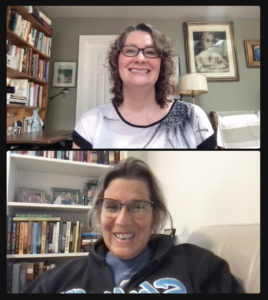
Have you ever met someone and after just a few minutes knew she would become a forever friend? That’s how I felt when I met Deirdre Fagan, an amazing woman, who has taken the enormous grief she has experienced in her life and turned it into art. Deidre is a beautiful writer whose latest book tells the story of the marriage with her late husband Bob who died of ALS. Of course, it’s a tragic story but also one of great love, courage, and hope. Find A Place for Me is a primer not only on how to face one’s last days but on how to live to the fullest the gift that is life.
Diane: Deirdre, thank you for doing this! We know each other for a short time but it feels like forever—in all the best ways! We met a few months ago at the Writers’ Colony at Dairy Hollow in Arkansas. I’m so fortunate to know you.
Deirdre: I feel the same way. I think we both brought our New York with us to Arkansas, even though neither of us lives in New York anymore. It helped us to connect.
Diane: I think so too. I’m very excited about your new book! Tell us what it’s about.
Deirdre: It’s about my philosopher husband Bob’s diagnosis of ALS, and how we joined hands, raised glasses, and playfully taught each other how to simultaneously hold on and let go in the 10 months he had left. It has a lot of poignant moments. You can’t talk about death without that happening. But it’s also laced with our dark humor, playfulness, and love for each other … and our honesty with each other.
Diane: What was going on in your life when Bob got the diagnosis?
Deirdre: We had a daughter who was three, a son who was eight. We were both originally from New York and had been living in a small Midwestern town for six years.
“We Don’t Expect Anything Else Crazy”
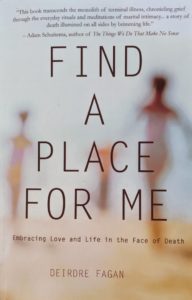 We had my father move in with us shortly after we moved, but he wasn’t with us very long when he died unexpectedly of a heart attack. My brother was struggling at the time, and learning of our father’s death, I think, pushed him over. We lost him a couple of weeks later. So, at the time of Bob’s diagnosis, we had been complimenting ourselves, “Hey, it’s been five years, and I think we have finally recovered from the shock of those two losses coming so close together.” They were the last of my family members and Bob was incredibly close to them too. So, we had grieved together.
We had my father move in with us shortly after we moved, but he wasn’t with us very long when he died unexpectedly of a heart attack. My brother was struggling at the time, and learning of our father’s death, I think, pushed him over. We lost him a couple of weeks later. So, at the time of Bob’s diagnosis, we had been complimenting ourselves, “Hey, it’s been five years, and I think we have finally recovered from the shock of those two losses coming so close together.” They were the last of my family members and Bob was incredibly close to them too. So, we had grieved together.
We were like, “Here we are. We’re on the other side of that grief. And thankfully we’re both pretty young. We’re in our early 40s. So, we can count on things being somewhat okay, health wise, and we don’t expect anything else crazy.” We had also just come to terms with where we were living.
Just as we thought we had stabilized everything in our lives, the rug was pulled out from under us again when Bob discovered he had a twitch in his arm–fasciculation is the medical term. Bob worked out a lot. He was very muscular and had that tough guy look. When he brought the twitches up to me, it was finals week for each of us and he said, “Hey, I’ve got this twitch in my arm and so I made a doctor’s appointment.” I actually started laughing because making a doctor’s appointment for a twitch sounded like the most absurd thing ever. He said, “No, it’s been going nonstop for a couple weeks. When I finish working out, it doesn’t go away.”
“The Lifespan They Offer at Diagnosis Is Usually Two to Five Years As A Range”
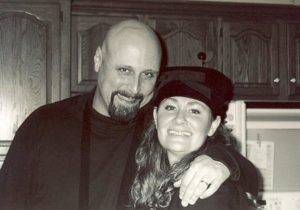 I didn’t know anything about neurological disorders. I don’t think he did either. But he was concerned, so he made an appointment with our primary care physician, who sent him to a neurologist in our little town. The neurologist immediately said, “You need to get to a major city to be assessed.” So, within the few weeks of December between final exam week at our university and New Year’s Eve, we went from, “Oh, you have a twitch that isn’t stopping” to “You’ve been diagnosed with a terminal illness that has no treatment.”
I didn’t know anything about neurological disorders. I don’t think he did either. But he was concerned, so he made an appointment with our primary care physician, who sent him to a neurologist in our little town. The neurologist immediately said, “You need to get to a major city to be assessed.” So, within the few weeks of December between final exam week at our university and New Year’s Eve, we went from, “Oh, you have a twitch that isn’t stopping” to “You’ve been diagnosed with a terminal illness that has no treatment.”
ALS is a neurological disorder that affects the muscles you can control. The lifespan they offer at diagnosis is usually two to five years as a range. Typically, when they say that, the good years of the two are one. The time span depends on where your ALS originates, but typically people become fully paralyzed in their bodies. Their minds are completely intact, but they’re trapped. They can’t speak, they can’t eat, they start having trouble breathing. If you choose life-extending measures, they usually include a feeding tube, a tracheotomy, and of course either bedbound eventually or a wheelchair.
Diane: That’s huge.
Deirdre: It was huge. And it was the holiday season, which everybody knows is stressful anyway. And we had little people, which makes it even more stressful because you’re concerned about them having a good holiday. Bob faced it very much head on, which is part of why I wanted to write the book. A lot of people’s responses to Bob were about how gracefully he accepted his illness, how he addressed it and made his decisions about what he wanted, and about how we both brought humor and playfulness and joy of life to the experience.
“Do We Want to Spend the Rest of the Time You Have Grieving, When You’re Still in Front of Us and with Us?”
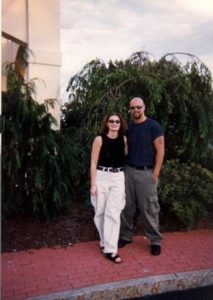 I thought with all the conversations about death that I believe we still need to have as a society, it seemed like an important book to write. Of course, I wrote it for my children too. They were young, they don’t remember a lot of what was happening, so it was to document that time on a personal level as well.
I thought with all the conversations about death that I believe we still need to have as a society, it seemed like an important book to write. Of course, I wrote it for my children too. They were young, they don’t remember a lot of what was happening, so it was to document that time on a personal level as well.
Diane: You write in the book that he taught people how to die. Can you say what that even means?
Deirdre: That was the response of many people after he died: “Bob taught me how to live with how life-embracing he was, but then how he chose to die also taught me something about dying.” In the first few months, we reacted the way many people do, which was absolutely destroyed, falling on the floor, crying all the time, just in shock and devastated. But I think the difference people noticed was that after Bob and I did that for a while, we started to look at each other and say, “Look, we’re on the clock.” I mean, Bob’s on the clock and we’re on the clock as a family and a couple and friends. Do we want to spend the rest of the time you have grieving, when you’re still in front of us and with us?”
“Bad Things Are Happening, But Let’s Try to Embrace the Moments We Have When We Have Them”
We had that conversation as a couple. Bob was like, “Certainly not.” We’ve had a lot of stuff happen, and this isn’t how we’ve ever dealt with it. We’ve always said, “Yeah, bad things are happening, but let’s try to embrace the moments we have when we have them.” It doesn’t mean you shove your grief under the rug because we were certainly still grieving at the same time. We just didn’t want that to be all that we were doing. We wanted to also try to be present. I hope that that’s the primary thing that shines through in the book.
Diane: There’s so much that’s unique in this book in terms of Bob as a person, you guys as a couple and your approach to what was going on. But another unique thing is that you became close with your future husband while Bob was ill.
Deirdre: Exactly. We did. We all look at our friendships as tiers of friendships, or at least I do, like these circles that go around us. We have that inner circle that maybe we will divulge every emotion to, even the ones we’re embarrassed by. Then there are others that maybe we show certain parts of ourselves to or we’re with them in certain ways. This friend of ours, Dave, who is now my husband, was an outer tier friend, is what I like to say. He was a colleague at my job. We’d been on some committees together. We’d actually both served the faculty senate together at one time when he was my backup. So I knew him, but I didn’t really know anything about him.
“Marriage Is a Long Conversation”
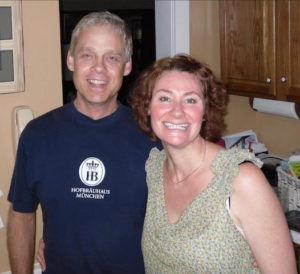 I didn’t know whether he was gay or straight, whether he was in a relationship. I didn’t know where he lived. But we socialized with him once or twice a year, either at my large party, I throw one big party a year, the Saint Paddy’s Day party that’s mentioned in the book, or a mutual friend would invite us over to a dinner party or something and he would be there. Our conversations prior to when Bob was sick were pretty limited. But having lost so many people, at least through my experience–and it may differ from others– often the people who can be there for you during these times are not the people closest to you or to the person you’re losing, because they are so consumed by their own grief over the situation that they can’t help you manage yours. Dave happened to be, as one of those people who was in the outer circle of our lives, somebody who started to offer to help and stop by. And through a few different gestures like that, he became kind of a regular at our house, and that’s how we all got to know each other better.
I didn’t know whether he was gay or straight, whether he was in a relationship. I didn’t know where he lived. But we socialized with him once or twice a year, either at my large party, I throw one big party a year, the Saint Paddy’s Day party that’s mentioned in the book, or a mutual friend would invite us over to a dinner party or something and he would be there. Our conversations prior to when Bob was sick were pretty limited. But having lost so many people, at least through my experience–and it may differ from others– often the people who can be there for you during these times are not the people closest to you or to the person you’re losing, because they are so consumed by their own grief over the situation that they can’t help you manage yours. Dave happened to be, as one of those people who was in the outer circle of our lives, somebody who started to offer to help and stop by. And through a few different gestures like that, he became kind of a regular at our house, and that’s how we all got to know each other better.
Diane: What was interesting and unique is that Bob suggested or brought up the possibility that Dave might be somebody you might be interested in having a relationship with.
Deirdre: It’s funny because the way he put it was, “You two can really talk. You should pay attention to that.” I knew what he was saying because we used to always quote Nietzsche, the philosopher who said that marriage is a long conversation. We believed the key to a strong marriage is the conversations you have.
“As Soon As He Knew His Diagnosis, He Was Already on How He Was Going to Manage It”
So, I guess when Bob was observing me talking to Dave, he could see how we were communicating. Bob always had a pretty good read on people. He was just like, “Take note of that.” I knew what the code was. “Hey, this guy might be somebody you might think about in other ways.”
At first it was kind of jarring. I hadn’t thought about it that way. But then it became a playful joke between us. For sure that endorsement of a relationship, one, and a relationship with Dave, two, certainly didn’t hurt in our getting together later. It made it very much a smooth transition and a comfortable one in a way that maybe wouldn’t be for somebody else who didn’t have that conversation.
Diane: As we get older, we think more about maybe being without a spouse. But at your age, for Bob to think of you moving on with somebody else–and this was a short illness from start to finish. It’s not like he had a ton of time to process.
Deirdre: No. And he was already thinking about that the day after his diagnosis. There’s a scene in the book where right after his diagnosis, he’s already talking to me about my future. And I was not there. He was very quick to confront things. I think because of his training as a philosopher, as soon as he knew his diagnosis, he was already on how he was going to manage it. Part of that was not only processing his own management of his illness, but what that would mean for me and the kids, and what would be best for us when he was gone.
He Had Always Prioritized Us, and I Think It Was Just One of His Last Loving Ways of Doing That
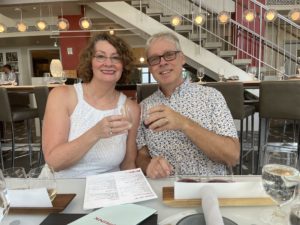 He knew me well enough to know that I am happier when I’m in a relationship than when I’m not. We had had conversations about wanting the kids to have two parents as part of their lives. I think he was already thinking, “Geez, these kids are really young. I don’t want Deirdre alone. And I also want them to have another person to help nurture them.”
He knew me well enough to know that I am happier when I’m in a relationship than when I’m not. We had had conversations about wanting the kids to have two parents as part of their lives. I think he was already thinking, “Geez, these kids are really young. I don’t want Deirdre alone. And I also want them to have another person to help nurture them.”
Diane: That’s amazing. I know the story, but each time I hear it, the generosity is so touching. We all wish that we would be that generous if we were in his situation, but I don’t know many people who would.
Deirdre: That’s one of the ways I think he taught people how to die. He was just so other-looking. I always say, “I hope I will behave as Bob did if I’m ever in that situation. I hope that I can be that selfless.” Because I think often when you’re in that situation, you just cannot get outside of your own suffering because you’re the one that’s dying. In that space, it’s very hard, I think, to want people to go on without you, to imagine them going on without you. It’s painful. But he had always prioritized us, and I think it was just one of his last loving ways of doing that. What he told his family too was, “The best thing you can do for us is take care of Deirdre and the kids,” which is just amazing.
“Sex Is One of the Last Things to Go When People Are Dying”
Diane: The reader also learns a lot about you, which is one sign of a really good memoir. You also take difficult topics head on, both in real life and in the book. It’s really helpful for people to read the parts about sex because that’s not something people talk about when we talk about people dying or where their physical abilities deteriorate. So tell us about that.
Deirdre: It’s funny. I have a friend who’s a hospice nurse. I shared with her an excerpt that talks about sexuality in the book. She told me that sex is one of the last things to go when people are dying. So yeah, we don’t talk about this, but it’s a human drive, and it doesn’t go away just because you’re ill or you’re dying. In fact, it may be one of the last things you want to do, if you can. Bob and I prioritized that. Our sex life had always been important to us, and we wanted to try to continue that as much as we could, as long as we could. This meant for me switching my roles as his nurse and caregiver as time went on to also going back to that space where he was just my sexy husband, Bob.
I’ve talked about that in some of my poems and at some conferences. It also meant I physically had to do a lot more, so I needed to talk about that too. I wanted people to know that people with ALS can still have sex lives, and I think we need to talk more about why that’s challenging. ALS isn’t just a terminal illness. It leads to disability.
“From the Beginning of His Illness, I Just Wanted to Be His Team”
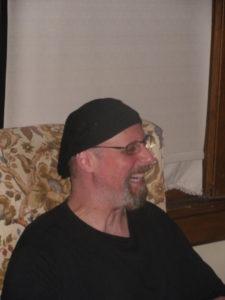 We don’t talk much about disability and sexuality. We tend to want to remove sex from a conversation once somebody is not completely healthy and physically able. We want to say, “That’s not part of their lives anymore.” But it’s absolutely part of everyone’s life.
We don’t talk much about disability and sexuality. We tend to want to remove sex from a conversation once somebody is not completely healthy and physically able. We want to say, “That’s not part of their lives anymore.” But it’s absolutely part of everyone’s life.
Diane: You talk about sex. You also talk about shit, literal shit, which is another taboo you dive right into.
Deirdre: Bob didn’t like all the euphemisms, like those for diapers. He was like, “Just call them diapers. Let’s not pretend that they’re something else.” He looked at everything straight on. Perhaps that was part of his processing and acceptance, but I did what Bob wanted. I mean, from the beginning of his illness, I just wanted to be his team. I wanted to do whatever he needed me to do, no matter how hard it was for me. Calling them diapers was weird in the beginning because it felt infantilizing, and I didn’t want to do that. But I got what he was saying. “We don’t need to sugarcoat this. This is what I need now.” I think that’s why it’s in the book, the conversations we had about it and the ways in which he also felt badly that he was at that point, and I really didn’t. It’s just something you do for someone you love, and it just didn’t faze me.
“My Job Was to Try to Absorb That for Him and Take It Away”
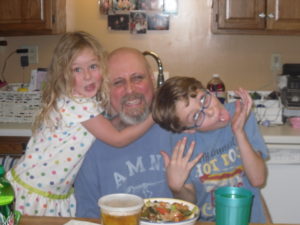 We start this process as parents with our infants, and we don’t give it a second thought. The child is not able to go into the bathroom on a toilet. We help them. They need to be clean. So when Bob reached that point, that was my same thought. “Why are you even fretting about this? You need to be clean. You need to go to the bathroom. This is what we do. It’s nothing we need to sweat about.” But it was embarrassing for him. So, my job was to try to absorb that for him and take it away.
We start this process as parents with our infants, and we don’t give it a second thought. The child is not able to go into the bathroom on a toilet. We help them. They need to be clean. So when Bob reached that point, that was my same thought. “Why are you even fretting about this? You need to be clean. You need to go to the bathroom. This is what we do. It’s nothing we need to sweat about.” But it was embarrassing for him. So, my job was to try to absorb that for him and take it away.
Diane: I think that’s important for people to hear. So tell us now where you are. How are the kids doing now?
Deirdre: Our daughter was three and our son eight when he was diagnosed. He died in less than a year, but they both had their birthdays. So they were four and nine. They’re doing great. I mean, my son is 19. My daughter just turned 14, so she’s heading off to high school. They’re wonderful kids, incredibly loving and generous people. I admire them as human beings. My daughter, because she was so young, is comfortable with people who have disabilities and has been from the moment she was with her dad. I wouldn’t be surprised if she went into some sort of caregiving position. She talks about being a teacher too. So, I think there’s been this really interesting, positive impact. Of course my son was incredibly empathetic and at ease too. But I think with her being younger, it was more surprising. She’s very comfortable with elderly people. My current husband just recently lost his mother. She had Parkinson’s, and my daughter was always at ease with Grandma.
“When We Decided to Get Married, He Actually Proposed to the Kids Too”
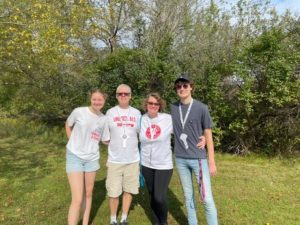 I think experiencing these things, or talking about them if we’re not experiencing them, is important. We have a much older population, older than we’ve ever had, and there are a lot more people in assisted living who need this kind of care, and want to live their lives too, and have sex and relationships. So, I think these are good conversations for everybody to be having.
I think experiencing these things, or talking about them if we’re not experiencing them, is important. We have a much older population, older than we’ve ever had, and there are a lot more people in assisted living who need this kind of care, and want to live their lives too, and have sex and relationships. So, I think these are good conversations for everybody to be having.
Diane: Absolutely. So the kids were still young. How did this work in terms of starting to date and taking that next step?
Deirdre: That’s actually one of the most remarkable things. Dave started coming around once or twice a week. They were used to him. He was around. They liked Dave. Dave played with them. He was a friend of the family. So, when we started getting involved, there was zero resistance from my kids. Not once did they ever say, “You’re not my dad or I don’t want you here.” None of that. They were very, very accepting of him.
When we decided to get married, he actually proposed to the kids too. He didn’t officially propose to me, but he did to them. So after we decided, we were having dinner as a group and he just said, “I want to ask you something. I’d like to marry your mom and be your stepdad. What do you think?” We call him second dad because I feel like stepdad isn’t quite right when other dad isn’t still living. So they have first dad and second dad or Bob dad and Dave dad.
Diane: Oh, that’s nice.
“May is ALS Awareness Month, So Having This Interview Right Now Is Wonderful”
Deirdre: We were very fortunate that even when they hit their teenage years, I mean, for Maeve, Dave is her dad. For Liam it probably was harder. We used to laugh that the first few years, he still called him Dave, and then at some point he just started calling him Dad. And then there was that period where if he was mad about something, Dave was Dave. And if he really wanted something, Dad was Dad. He didn’t even notice that. We called him out on that one day and he kind of laughed at himself like, “I didn’t even realize I’d do that, that I’d call him different names.”
Diane: That’s very funny. So what else is in your life? You’re a professor?
Deirdre: Yes. I’m a professor. I just finished a full collection of poetry and will be seeking a publisher. I’m working on a second memoir and I hope to finish the draft this summer. Mostly I’m just focused on giving this book a lot of attention. May is ALS Awareness Month, so having this interview right now is wonderful. We do a walk every year. I couldn’t do that right away. It was too painful. Bob died in 2012, and we started our walk, I believe, in ’15 or ’16. We’ve been doing that as a family ever since.
“I Also Struggle with Sadness and Grief. It Rears Its Ugly Head”
 That’s important to me because usually one in 20,000 people has ALS at any given time. Because they often die so quickly, I don’t feel the disease gets a lot of attention. They don’t have a lot of support. Our local chapter never reaches its goal. It’s very heartbreaking to me. So, we’ll see how the book does, but I want to give a portion of the royalties every year either to the walk or directly to the ALS Association. I want to support ALS awareness.
That’s important to me because usually one in 20,000 people has ALS at any given time. Because they often die so quickly, I don’t feel the disease gets a lot of attention. They don’t have a lot of support. Our local chapter never reaches its goal. It’s very heartbreaking to me. So, we’ll see how the book does, but I want to give a portion of the royalties every year either to the walk or directly to the ALS Association. I want to support ALS awareness.
Diane: Yeah. And hello, you have Have Love, a poetry collection, out and your short story collection just won something, right?
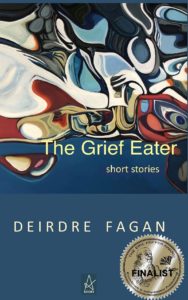 Deirdre: Yes. The Grief Eater was a category finalist for the Eric Hoffer Award. It was so exciting, so unexpected. My little gold stickers are on their way in the mail, so I can stick some on some books. So if anybody’s interested in that collection, I’ll have some cool little stickers that say, “Eric Hoffer finalist.” It’s on similar subjects but fiction, a cast of quirky characters all dealing with grief. I started that collection after my dad and brother died. I worked on some stories since Bob, but it was inspired by earlier experiences.
Deirdre: Yes. The Grief Eater was a category finalist for the Eric Hoffer Award. It was so exciting, so unexpected. My little gold stickers are on their way in the mail, so I can stick some on some books. So if anybody’s interested in that collection, I’ll have some cool little stickers that say, “Eric Hoffer finalist.” It’s on similar subjects but fiction, a cast of quirky characters all dealing with grief. I started that collection after my dad and brother died. I worked on some stories since Bob, but it was inspired by earlier experiences.
Diane: Do you believe that going through this experience has helped you live more in the moment?
Deirdre: Absolutely. I also struggle with sadness and grief. It rears its ugly head. Grief is with you forever. But I know how to get myself out of those feelings and when to let myself have them.
“Have Those Memories, Savor Them, Continue to Grieve, and Also Know It’s Okay to Go on Living”
To really process your grief, you have to let yourself feel the pain and not avoid it. Avoiding through activity isn’t good all the time, but if you’re living in that suffering for too long, you need to get yourself moving. That balance is something I have very much learned through processing my own grief. Have those memories, savor them, continue to grieve, and also know it’s okay to go on living. You should. It’s healthy and you need to because you’re still here. Right now, you’re still here.
Diane: Amen. That is so important. And that was something Bob wished for you. You’re doing it. So that’s wonderful.
Deirdre: Bob used to equate death with getting off a bus. He said, “The bus is coming for everybody. I’m getting off it now. You may be getting off it later, but we’re all getting off the bus,” We may end up with a terminal illness or a sudden death. You don’t know when it’s going to happen or what is, so just be in that moment as much as you can. Enjoy the life that you can.
Diane: Great words of wisdom from my very wise friend. Thank you, Deirdre.
Deirdre: Thank you so much for having me. I’m so fortunate to have you in my life as a new writer friend and a thinking, sensitive, wise friend. So thank you so much for talking to me.
Diane: Thank you. Back at you. Thank you for coming.
If you want to hear more of Deirdre’s thoughts, please sign up for her newsletter.
Here’s a review I wrote on Find a Place for Me, published in PRISM International.
As always, I’d love to hear from you. Write a comment or send me an email.
See you soon!
XOXO
Diane

If You Know Another Amazing Woman (Or Person Of Any Gender!) Who Might Like To Join Us At WomanPause, Please Forward This Link: WomanPause



Unbelievable! What an incredible story! ALS is a beast, but the hope and joy and healing imparted by this author is so encouraging! I came away feeling grateful. Another great interview, Diane!
Thank you Janet! There is so much “hope and joy and healing” in Deirdre’s story. Deirdre is an amazing person, as was Bob.
Diane – reading this interview had an interesting side effect – I feel braver! Deirdre rose to the occasion so many times! Her courage appears to be contagious and that is a marvelous gift that she gives to the world. I will ask my public library to order her books. Thank you for introducing her to us.
Oh, Nicky! That all makes me sooooo happy! I think we do make each other braver–what a wonderful gift!
Thank you so much for these wonderful comments and encouragement, everyone. I am so sorry for your loss, Denise. The more I hear other people’s ALS stories, the more aware I am that many people are gone within a year. It is an absolutely horrible and devastating diagnosis and I am so sorry it took your mother. I hope that Find a Place for Me brings more awareness, more funding for research, and more funds to help those currently suffering from the disease. Diane, I so appreciate your sharing my story and am so very grateful to know you. <3
Thank you, Deirdre! XOXO
So deep and touching. Amazing story.
Thank you, Ed! It is an amazing story, and Deirdre is an amazing person!
What a wonderful interview. I love Deirdre and I’ve never even met her. Something I so appreciate is the matter of factness of both her and Bob looking at things the were they are/were, no denial, and making the most of every day left. Beautiful and moving.
How did I know you’d love Deirdre, Alison! “Looking at things the way the are/were, no denial, and making the most of every day.” What a lesson for us all!
ALS is a devastating illness. My mom died of this less than a year after diagnosis. I admire Deirdre’s strength and grace and am happy she found love again.
Oh, Denise! I did not know this! Thank you for sharing. I am sure your words will mean a lot to Deirdre. XO